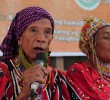Calubid and Limjoco are numbers 21 and 23, respectively, in the Department of Justice�s list of 51 individuals charged with rebellion.
In all the seven ongoing cases, the military has denied the writ and have avoided court appearances. For once, however, Palparan, Samson and Boac were forced to appear in court lest they would be cited for contempt.
The Parani-Velasco case had been submitted for decision in February but nothing has been issued so far.
In December 2003, the justice department found no probable cause against Msgt. Donald Caigas who was charged with murder and kidnapping of human rights worker Eden Marcellana and peasant leader Eddie Gumanoy and the arbitrary detention of four other survivors in Oriental Mindoro. An appeal filed by lawyers for the victim�s families to the justice secretary in February 2004 was also denied belatedly on Nov. 27, 2006 despite court records showing positive identification of Caigas by the four survivors who turned witnesses.
Caigas remains at large, reports say.
Seeking justice
If the extrajudicial executions and forced disappearances are indeed part of state policy and the government�s counterinsurgency program, it is then impossible for victims and their relatives to obtain justice under the current dispensation. This also explains the comment of a police investigator assigned to probe into the killing of Bp Alberto Ramento of the PIC that they are being made to �clean up the mess of the military.�
What then is there left for the victims and their relatives to do to obtain justice?
They, along with people�s organizations and human rights groups have turned to the international community to generate pressure on the Arroyo government to stop the killings and forced disappearances. In October 2006, they filed a complaint before the UN Human Rights Council in Geneva. The Council was expected to ask the Arroyo government to reply.
Early November, a similar case was also filed before the Permanent People�s Tribunal (PPT) in The Hague, Netherlands, which is also the seat of the International Crime Tribunal (ICC) and the International Court of Justice. The PPT is an �international opinion tribunal, independent from any State authority, which publicly and analytically examines cases regarding violations of human rights and rights of peoples.�
Organized in 1979, the PPT is not lacking in integrity having Nobel Peace Prize laureates and internationally-recognized personalities as members of its Jury. Although it cannot compel the Arroyo government to implement its judgment, it can further generate international pressure to put a stop to the political killings and forced disappearances. To date, the PPT has held 30 sessions, including the first session on the Philippines in 1980 that found the Marcos dictatorship guilty of human rights violations.
The victims of Martial Law also filed and won a class action suit against the Marcos family before the Federal District Court of Hawaii. But the victims have yet to receive the indemnification due them because of the efforts of the Arroyo government to claim all Marcos accounts discovered abroad and its failure so far to pass a bill in Congress providing compensation to the victims.
Victims of the Arroyo government may also file a class action or criminal suit in the future when the Arroyo government is no longer in power.
Meantime, however, people�s organizations, human rights groups, the victims and their families may have to generate strong public condemnation locally with the same intensity that made the Arroyo government backtrack on its attempts to revise the Constitution. It could also let more international pressure bear down on the Arroyo government affecting it where it hurts most, foreign aid and investments, and remittances of foreign exchange. Bulatlat










